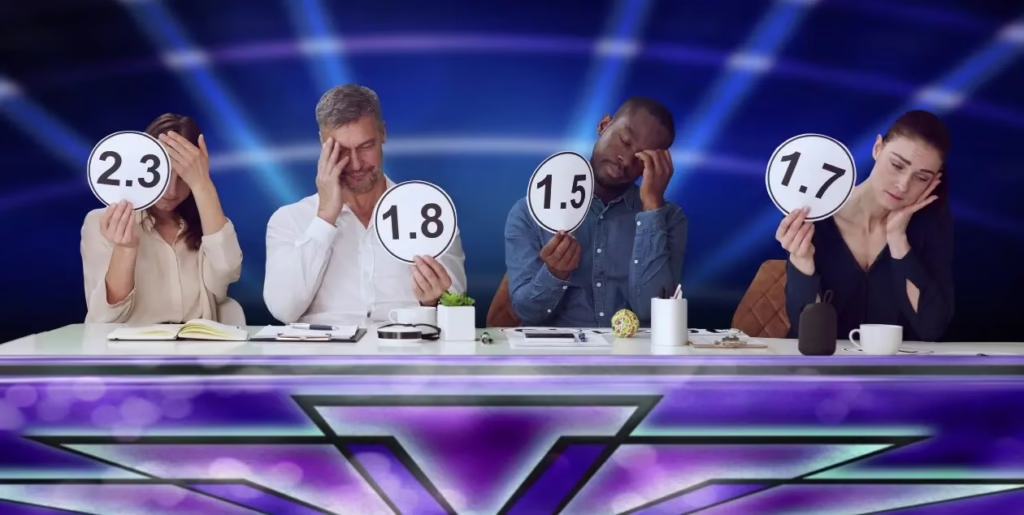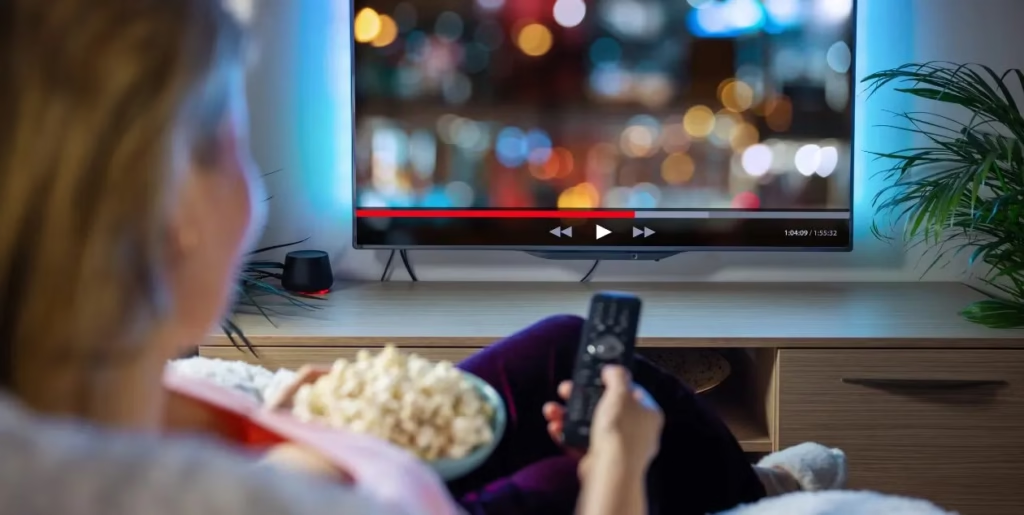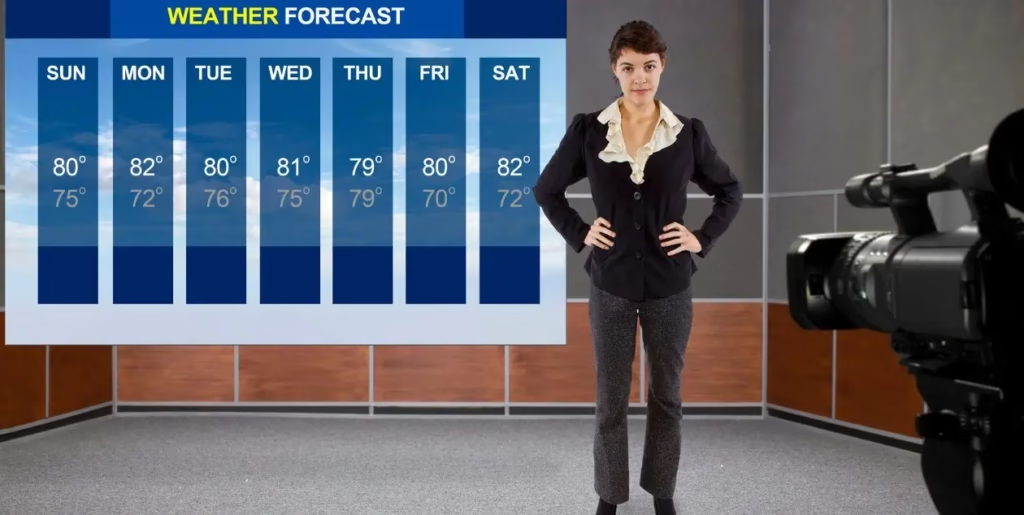テレビ番組は英語学習の宝庫です!生きた英語表現や文化を楽しく学べる絶好の機会を提供してくれます。特に英語圏の番組は、リスニング力向上やネイティブの表現を学ぶのに最適です。しかし、「どんな番組を選べばいいの?」「番組について英語で話すには?」と悩んでいませんか?この記事では、テレビ番組のジャンル別英語表現から実際の会話例、さらには英語学習への効果的な活用法まで詳しく解説します。
英語圏のテレビ番組ジャンル

英語圏、特にアメリカとイギリスのテレビ番組は、英語リスニングの練習に最適です。まずは主要なジャンルとその特徴を英語で理解しましょう。
エンターテイメント系番組
- sitcom(シットコム/シチュエーション・コメディ)
解説:決まった登場人物と舞台で展開されるコメディドラマ。
例:Friends is one of the most popular sitcoms of all time.
(『フレンズ』は史上最も人気のあるシットコムの一つです。) - soap opera(ソープオペラ/連続メロドラマ)
解説:恋愛や家族、日常のドラマを描く長寿の連続ドラマ。
例:General Hospital and Days of Our Lives are two of the most famous American soap operas, both running for decades.
(『ジェネラル・ホスピタル』や『デイズ・オブ・アワ・ライブズ』は、何十年も続くアメリカの有名なソープオペラです。) - reality show(リアリティ番組)
解説:一般人や有名人が実際の生活や競争に挑む番組。
例:Big Brother and Love Island are hugely popular reality shows in the UK, attracting millions of viewers every season.
(『ビッグ・ブラザー』や『ラブ・アイランド』は、イギリスで毎シーズン何百万人もの視聴者を集める大人気リアリティ番組です。)
情報・教育系番組
- news bulletin / news program(ニュース番組)
解説:最新のニュースや出来事を伝える番組。
例:The evening news bulletin covers the day’s top stories.
(夜のニュース番組はその日の主な出来事を報道します。) - documentary(ドキュメンタリー)
解説:実際の出来事や人物、社会問題などを記録・紹介する番組。
例:Planet Earth and The Blue Planet are acclaimed British documentaries narrated by David Attenborough.
(『プラネット・アース』や『ブルー・プラネット』は、デイビッド・アッテンボローがナレーションを務めるイギリスの高評価ドキュメンタリーです。) - weather forecast / weather report(天気予報)
解説:天気や気象情報を伝える番組やコーナー。
例:The BBC Weather forecast is broadcast several times a day in the UK, and The Weather Channel is a go-to source in the US.
(イギリスでは『BBC ウェザー』が一日に何度も放送され、アメリカでは『ウェザー・チャンネル』が定番です。)
ジャンル別の英語表現と人気番組

各ジャンルについての表現をもっと詳しく見ていきましょう。これらの表現を使いこなせば、英語でテレビ番組について話せるようになります。
バラエティ・クイズ系番組
- game show(ゲームショー)
解説:参加者がクイズやゲームで賞品を競う番組。
例:Jeopardy! and Wheel of Fortune are iconic American game shows, while Who Wants to Be a Millionaire? started in the UK and became a global hit.
(『ジェパディ!』や『ホイール・オブ・フォーチュン』はアメリカの代表的なゲームショーで、『クイズ$ミリオネア』はイギリス発祥で世界的に有名です。) - variety show(バラエティ番組)
解説:コント、歌、ゲームなど様々なコーナーがある娯楽番組。
例:Saturday Night Live is an iconic American variety show, and Ant & Dec’s Saturday Night Takeaway is a popular choice in the UK.
(『サタデー・ナイト・ライブ』はアメリカの象徴的なバラエティ番組で、『アント&デックのサタデー・ナイト・テイクアウェイ』はイギリスで人気です。) - panel show(パネルショー/クイズバラエティ)
解説:複数のゲストや有名人がトークやクイズに参加する番組。
例:QI and Would I Lie To You? are top British panel shows known for their humor and clever questions.
(『QI』や『ウッド・アイ・ライ・トゥー・ユー?』は、ユーモアと機知に富んだ質問で知られるイギリスの人気パネルショーです。)
専門ジャンル番組
- cooking show(料理番組)
解説:料理の作り方やレシピを紹介する番組。
例:The Great British Bake Off is a beloved UK cooking show known for its friendly competition and delicious bakes.
(『グレート・ブリティッシュ・ベイクオフ』は、イギリスで愛される料理番組で、和やかな競争と美味しそうな焼き菓子で有名です。) - travel show(旅番組)
解説:世界各地の文化や観光地を紹介する番組。
例:Globe Trekker is a popular travel show that explores destinations around the world.
(『グローブ・トレッカー』は世界中の目的地を探訪する人気の旅番組です。) - home improvement show(住宅リフォーム番組)
解説:家のリフォームやDIYのアイデアを紹介する番組。
例:Grand Designs is a well-known British home improvement show that follows ambitious building projects.
(『グランド・デザインズ』は、壮大な建築プロジェクトを追うイギリスの有名な住宅リフォーム番組です。)
テレビ番組について英語で会話する

テレビ番組について英語で話すときに使える基本フレーズをマスターしましょう。
番組について質問する
- “Have you been watching any good TV shows lately?”
(最近何か面白いテレビ番組観てる?) - “What’s your favorite sitcom of all time?”
(今までで一番好きなシットコムは何?) - “Do you prefer reality shows or documentaries?”
(リアリティ番組とドキュメンタリー、どちらが好き?)
番組について感想を述べる
- “I’m hooked on [show name]. It’s so addictive!”
([番組名]にハマってる。すごく中毒性がある!) - “The acting in this drama is phenomenal.”
(このドラマの演技は素晴らしいね。) - “I couldn’t get into it. The plot was too slow for me.”
(あまり興味が持てなかった。ストーリー展開が私には遅すぎた。)
友人同士の会話例で学ぶ実践表現

実際の会話例から、テレビ番組について話すときの自然な表現を学びましょう。
会話例1:様々なジャンルについて
A: Have you been watching any good TV shows lately?
(最近何か面白いテレビ番組観てる?)
B: Yeah, I started rewatching Friends. I forgot how funny that sitcom is!
(うん、『フレンズ』をまた観始めたんだ。あのシットコムがどれだけ面白いか忘れてたよ!)
A: Classic! My mom still watches General Hospital, that old soap opera.
(定番だね!うちの母親はいまだに『ジェネラル・ホスピタル』っていう昔からあるソープオペラを観てるよ。)
B: Haha, my grandma loves those too. I’m more into reality shows like Love Island. It’s so addictive!
(笑、うちのおばあちゃんも好きだよ。僕はどっちかというと『ラブ・アイランド』みたいなリアリティ番組の方がハマるな。)
A: I get that. I also enjoy watching The Graham Norton Show. That talk show always has the best celebrity guests.
(わかる。私は『グレアム・ノートン・ショー』も好き。あのトークショーはいつも最高のゲストが出るよね。)
B: And have you ever tried Jeopardy!? That game show is so challenging.
(『ジェパディ!』観たことある?あのゲームショーは本当に難しいよ。)
A: Sometimes! I usually watch the news bulletin on BBC in the morning, though.
(たまに観るよ。でも普段は朝にBBCのニュース番組を観てるかな。)
B: I love a good documentary. Planet Earth blew my mind with its amazing footage.
(いいドキュメンタリーも好きだな。『プラネット・アース』は映像がすごすぎて圧倒されたよ。)
A: Oh, and don’t forget about variety shows like Saturday Night Live. The sketches are hilarious.
(あ、あと『サタデー・ナイト・ライブ』みたいなバラエティ番組も忘れちゃいけないね。コントがめっちゃ面白い。)
B: True! I also enjoy talent shows like Britain’s Got Talent. Some of the acts are incredible.
(確かに!『ブリテンズ・ゴット・タレント』みたいなタレントショーも好きだな。すごいパフォーマーが出てくるよね。)
A: And when I’m hungry, I love watching The Great British Bake Off. That cooking show always makes me want to bake something.
(お腹が空いてるときは『グレート・ブリティッシュ・ベイクオフ』を観るのが好き。あの料理番組を観ると何か作りたくなるんだよね。)
B: Same here! There are so many types of TV shows these days, it’s hard to choose what to watch.
(わかる!今は本当にいろんな種類のテレビ番組があるから、何を観るか迷っちゃうよね。)
会話例2:お気に入り番組について深く語る
A: You know, I could watch The Great British Bake Off all day. That cooking show is just so relaxing and inspiring.
(『グレート・ブリティッシュ・ベイクオフ』なら一日中観ていられるよ。あの料理番組は本当に癒されるし、やる気が出るんだ。)
B: I get that! I love how supportive the contestants are. It’s not like those intense reality competition shows where everyone’s fighting.
(分かる!出場者同士がすごく優しいよね。みんながバチバチに競い合うリアリティコンペ番組とは違って。)
A: Exactly. And the judges give such helpful feedback. Plus, I always end up craving cake after every episode!
(そうそう。審査員のコメントも優しいし、毎回観終わるとケーキが食べたくなるんだよね。)
B: For me, nothing beats a good crime drama. I’ve been hooked on Line of Duty lately.
(僕はやっぱり犯罪ドラマが一番だな。最近は『ライン・オブ・デューティ』にハマってるよ。)
A: Oh, I’ve heard that’s really gripping. What do you like about it?
(あれはすごく引き込まれるって聞いたけど、どこが好きなの?)
B: The plot twists are amazing, and the writing is so clever. You never know who to trust. Plus, the acting is top-notch—it’s like watching a movie every week.
(どんでん返しがすごいし、脚本も本当に巧妙なんだ。誰を信じていいのか分からなくなるし。演技も最高で、毎週映画を観てるみたいだよ。)
A: Sounds awesome. I usually go for sitcoms when I want to relax. Brooklyn Nine-Nine always makes me laugh.
(いいね。私はリラックスしたいときはシットコムを観るよ。『ブルックリン・ナイン-ナイン』はいつも笑わせてくれる。)
B: That’s a great one! The characters are hilarious, and the episodes are short, so it’s easy to binge-watch.
(あれはいいよね!キャラクターがみんな面白いし、1話が短いから一気見しやすい。)
A: Have you ever watched Planet Earth? That documentary has some of the most stunning wildlife footage I’ve ever seen.
(『プラネット・アース』観たことある?あのドキュメンタリーは今まで観た中で一番すごい自然映像があるよ。)
B: Yes! David Attenborough’s narration is so calming, and I always learn something new.
(あるある!デイビッド・アッテンボローのナレーションも落ち着くし、いつも新しい発見があるよね。)
A: Honestly, with all these amazing shows, I never get bored of TV.
(正直、こんなに素晴らしい番組があるから、テレビに飽きることがないよ。)
テレビ番組を使った英語学習のコツ

テレビ番組を英語学習に効果的に活用するためのコツをご紹介します。
1. レベルに合った番組選び
英語力に合わせた番組選びが重要です:
- 初心者向け:
- 子ども向け番組(Sesame Street, Peppa Pig)
- シンプルなシットコム(Friends, The Big Bang Theory)
- クッキング番組(基本的な説明が多い)
- 中級者向け:
- トークショー(The Graham Norton Show, The Ellen DeGeneres Show)
- ドキュメンタリー(特にナレーションがはっきりしているもの)
- ニュース番組(BBC World News)
- 上級者向け:
- 早口の会話が多いドラマ(Sherlock, Doctor Who)
- イギリスのパネルショー(QI, Would I Lie to You?)
- 専門用語が多い医療・法廷ドラマ(Grey’s Anatomy, Suits)
2. 効果的な学習方法
- アクティブ視聴:ただ見るだけでなく、メモを取りながら視聴しましょう。
- 段階的アプローチ:
- 最初は字幕付きで全体を理解
- 次に英語字幕で細部を把握
- 最後に字幕なしでチャレンジ
- シャドーイング:好きなシーンのセリフを真似て発音練習しましょう。
- 語彙リスト作成:新しい表現やスラングをノートにまとめましょう。
- 要約練習:エピソードの内容を英語で要約してみましょう。
英語で書く:最新テレビトレンドレビュー

以下は、テレビ番組の最新トレンドについての英語エッセイ例です。このような形式で英語でレビューを書く練習をしてみましょう。
Essay: Recent Trends in Television Programming
In 2025, the landscape of television programming continues to evolve rapidly, shaped by technological innovation, shifting viewer preferences, and the ongoing expansion of streaming platforms. Several key trends define the current era of TV, reflecting both changes in how content is produced and how audiences engage with it.
1. The Dominance and Diversification of Streaming
Streaming services remain the primary driver of television consumption. Major platforms like Netflix, Apple TV+, Disney+, and Max are not only competing for global audiences but are also increasingly investing in localized content to appeal to regional tastes. This has led to a remarkable diversity in programming, with new shows spanning genres from high-budget historical dramas and sci-fi thrillers to reality competitions and animated series. The rise of Free Ad-Supported Streaming Television (FAST) channels is also notable, offering curated, linear-style programming without subscription fees, making television more accessible to value-conscious viewers.
2. Personalization and AI-Driven Recommendations
One of the most significant shifts in recent years is the rise of personalization, powered by advanced algorithms and artificial intelligence. Viewers are now accustomed to receiving highly tailored recommendations based on their viewing history, preferences, and even contextual factors like time of day or mood. This data-driven approach not only enhances user satisfaction but also helps platforms retain audiences in an increasingly crowded marketplace.
3. Hybrid Monetization and Evolving Business Models
Traditional subscription and ad-supported models are being reimagined into flexible, hybrid approaches. Many platforms now offer tiered access, allowing viewers to choose between ad-free premium subscriptions or lower-cost, ad-supported options. This diversification of revenue streams helps media companies remain competitive and resilient amid changing consumer habits.
4. Genre Experimentation and Blending
Recent television programming is marked by a willingness to experiment with genre boundaries. Shows in 2025 often blend elements of drama, comedy, science fiction, horror, and even documentary formats, resulting in innovative storytelling. For example, series like Severance (Apple TV+) combine workplace drama with psychological sci-fi, while The Studio (Apple TV+) offers a comedic, meta-commentary on Hollywood itself. Reality TV continues to thrive, with new formats and docu-series exploring real-life events and social issues.
5. Technological Advancements in Production and Distribution
The adoption of cloud-based workflows, 4K resolution, immersive audio, and real-time interactivity is transforming both the production and delivery of television content. NextGen TV (ATSC 3.0) is revitalizing over-the-air broadcasting, bringing features like targeted advertising and on-demand capabilities to traditional TV. At the same time, improvements in broadband and 5G connectivity are making high-definition streaming standard across devices and regions.
Conclusion
In summary, television programming in 2025 is more dynamic, personalized, and innovative than ever before. The convergence of streaming, AI-driven personalization, hybrid business models, and technological advancements is reshaping both what we watch and how we watch it. As genre boundaries blur and local voices gain prominence, viewers can look forward to an ever-expanding array of content that caters to every taste and interest.
英語エッセイの書き方とトレンドレビュー分析

上記のエッセイは、英語でテレビ番組のトレンドについて書いた例です。このようなエッセイを書くときのポイントを学びましょう。
英語エッセイの基本構成
英語のエッセイは「導入(Introduction)」「本文(Body)」「結論(Conclusion)」の3段構成が基本です:
- 導入部:テーマや背景、主張(thesis statement)を明確に述べます。上記エッセイでは、テレビ業界が技術革新や視聴者の好みの変化によって急速に進化していることを紹介しています。
- 本文:主張を支える理由や具体例を段落ごとに説明します。上記エッセイでは、ストリーミングの多様化、パーソナライゼーション、ビジネスモデルの変化など、複数のトレンドを具体例と共に解説しています。
- 結論:主張をもう一度まとめ、全体を締めくくります。上記エッセイでは、テレビ番組が今後も多様でパーソナライズされた視聴体験を提供していくという展望を述べています。
レビューの書き方のポイント
- 具体例を挙げる:「Severance (Apple TV+)」や「The Studio (Apple TV+)」など、実際の番組名を挙げることで説得力が増します。
- パラグラフごとに一つのトピック:各段落は「ストリーミングの多様化」「パーソナライゼーション」など、一つのテーマに絞っています。
- つなぎ言葉を使う:「One of the most significant shifts」「Another notable trend」などの表現で、段落同士をスムーズにつなげています。
- 専門用語の適切な使用:「FAST channels」「AI-driven recommendations」などの専門用語を使いつつ、簡単な説明を加えています。
エッセイを書く際の実践的アドバイス
- 書く前にブレインストーミング:主要なポイントをリストアップしましょう。
- 構成を決める:各段落で何を述べるか計画を立てましょう。
- 簡潔な文で書く:一文が長すぎないように気をつけましょう。
- つなぎ言葉を使う:First, Furthermore, However, In conclusion などを適切に使いましょう。
- 具体例を入れる:For example, Such as などを使って具体例を示しましょう。
- 見直しをする:文法ミスやつながりを確認しましょう。
まとめ

英語圏のテレビ番組は、楽しみながら英語力を向上させる素晴らしいツールです。この記事で紹介したジャンル別の表現や会話例を活用して、テレビ番組について英語で話せるようになりましょう。また、番組視聴を通じて、リスニング力の向上だけでなく、発音練習や語彙力アップにも役立てることができます。
さらに、英語でテレビ番組のレビューやエッセイを書く練習をすることで、ライティング力も強化できます。今日からお気に入りの英語番組を見つけて、楽しみながら学習を始めましょう!英語圏の文化への理解も深まり、より豊かな英語表現が身につくはずです。
英語学習の次のステップ
この記事の内容を実践してみましょう!
- お気に入りの英語番組を1つ選んで、毎日15分間視聴する習慣をつけましょう
- 番組について英語で友達と話す、あるいは日記を書いてみましょう










英語・英会話の基礎を学びたい方はこちらから! ↓

語彙力強化したい方はこちらから! ↓





















































